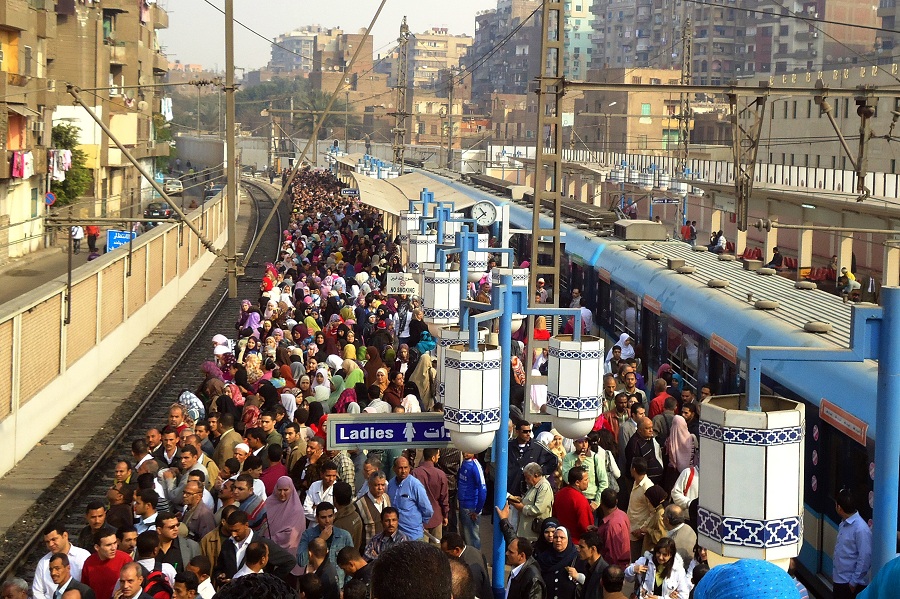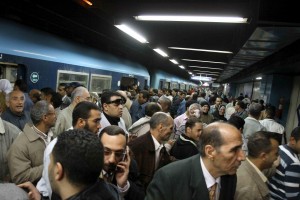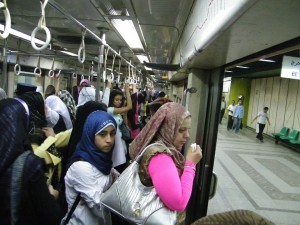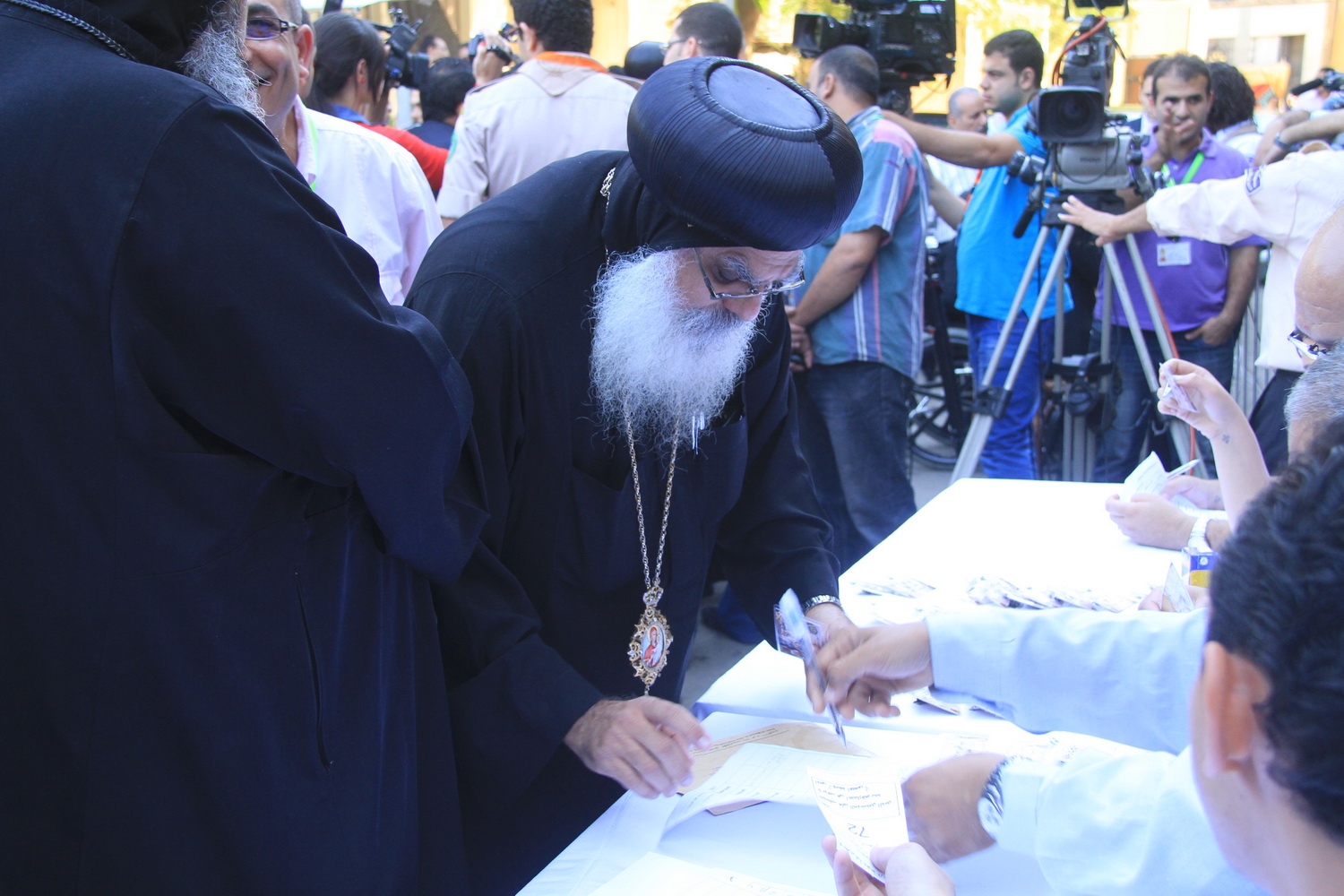
Hassan Ibrahim / DNE
From above ground the steps seem unremarkable, an entrance to an everyday public transport system, but as passengers descend they realise that there’s a whole new world they’re getting themselves into. Once fully downstairs, another life pumps from within. People from all walks of life huddle together in the cheapest, most efficient means of transportation in Cairo. Egyptians of every class, and even foreigners: Welcome to the underground world of the Metro.
Carrying between two and a half to three million passengers per day, the Metro definitely takes quite a heavy load off Cairo’s road traffic. But the results of such congestion in the narrow underground tunnel can sometimes be quite claustrophobic. On a Thursday afternoon, you might find yourself missing the first Metro cart which comes your way due to the large masses of passengers.
Unlike in European capitals, where the trains often leave crowds of passengers behind as people are loaded inside by the dozen, in Cairo you can fail to board a half empty carriage simply because of the number of passengers flooding out. This is despite the fact that Cairo’s Metro has two doors in every carriage specified for exit and two more specified for entrance. Nevertheless, Cairenes’ lack of patience leaves them fighting for the closest door.
One middle-aged veiled woman, Madame Hala, serenely crammed into the Metro’s comfortable seat, confessed without flinching “I do not abide by the entrance and exit doors. I don’t even see the purpose of having exit and entrance doors.” A pause, then with a smile, “unless, of course, my children are with me; then I abide. Fearing for them.”
Another passenger, Doaa’, had a suggestion to solve the entrance and exit problem.
“Once, I rode with a couple of girls from Resala Charity organisation, who kept alerting the people to the entrance and exit doors,” Doaa’ recalled. “The signs are not enough; the security available at each station should be keeping tabs on whether or not the passengers abide by the doors.”
Doaa’ was in the company of her friend Soha, they shared food and drinks during what seemed to be a long journey in the carriage. And it wasn’t only Doaa’ who had higher expectations about the Metro security.
Madame Hala’s biggest complaint about the Metro concerned the lack of security presence in certain stations, such as Ahmad Oraby station, near Ramsis. Madame Hala described the station’s stairs as “terrifying to the extent that I have to wait until another round of passengers arrive in the station to keep me company.”
It must be noted that security personnel have maintained a tougher grip on the Metro recently. This is mainly due to a phenomenon which has been prevalent since the security vacuum which followed the 25 January revolution; an explosion in the number of hawkers plying their trade on the Metro trains.
They have their own marketing strategy; the moment the Metro starts moving, they start their rotation around the cart, throwing whichever products they’re selling at the seated passengers’ laps to allow closer inspection. Should one passenger be drawn to the nice belts, the pleasant collection of colourful veils or even the inexpensive pen they might be in desperate need of, they take out their purse in an exchange seen by many as a win-win situation. Should they be uninterested, the hawker soon collects their products, exits the carriage at the next station and moves on to the next one.
It all seems like a nice bargain, except for the part where it is illegal. For a couple of months at least, an unprecedented security crackdown on hawkers has taken its toll on the Metro.
Recently a recorded announcement could be heard on a loop throughout the Metro stations, urging passengers not to interact with the hawkers, or give money to the beggars.
Hayam, a talkative Metro passenger, related the timing of the security crackdown to President Mohamed Morsy’s accession to power. A petite, female hawker, who preferred to remain anonymous, agreed.
In an insolent, mustard-yellow galabeya, the anonymous hawker made her way through the Metro’s platform. She barely looked like a hawker; the bag carrying her products was carefully packed in a way that could easily have her mistaken for an ordinary passenger, with a bit of excess luggage.
But once she set foot on the train, safe and sound as she watched its doors close and felt the carriage move, a transformation was in action as she quickly got up from her seat and started distributing her pins among the passengers amid calls to “make use of this amazing bargain.”
And as usual, as the cart came to a stall, the hawker transformed back to the ordinary passenger she was trying to pose as, making her way through the exit door. Too bad for her that a security guard was available outside and ready to catch her. In the blink of an eye, she swivelled, made her way back to the inside of the carriage, and pretended to have never planned an exit.
“You didn’t take the exit because of the security personnel available in the previous station?” I asked.
“Yes.”
“What would he do to you if he catches you selling your products inside the carriage?”
“He would fine me EGY 15 then let me go about selling my stuff.”

Hassan Ibrahim / DNE
Midway through this conversation the carriage made it to the next station and the anonymous hawker, quite rudely, picked up her phone instead of answering my questions. It was only when a police officer boarded the train and checked her out, as she was pretending to be on the phone, that all became clear.
Hayam, who was sitting opposite the hawker, hushed me; explaining that if she hadn’t feigned this imaginary phone call, she would have been most definitely taken out of the carriage and fined.
The next exit lacked any security guards, thus the anonymous hawker made her way out in peace, seeking a few extra pounds of profit in another carriage.
According to Metro regulations, hawkers caught in the Metro are asked to pay a fine of EGP 100. If they don’t have the money, all of their goods and money are confiscated.
“I don’t mind the hawkers’ presence within the cart; as long as they do not harm anybody, why should we prevent them from working?” Said Qesma, a young woman in hijab who uses the Metro everyday to go to college.
“Besides, some hawkers actually get a license to do business inside the cart.” Qesma was claimed, insisting that she once saw a hawker who had paid the security EGY 15 and attached a sign indicating that he was a licensed hawker.
“I’m against the security crackdown aimed at eradicating their presence,” Qesma said wholeheartedly, “surely if they could find an alternative job they’d never take up this one.”
Not all passengers agree with Qesma’s take on the matter. Soha, for one, feels that their presence within the Metro carts is “suffocating.”
“It’s not a good image that they reflect for the Metro,” Soha elaborated, “though one also eventually acknowledges it’s their means for a living.”
Despite the differences in their opinions, all the ladies interviewed admitted to having bought something from the hawkers at least once during their travels on the Metro.
Worryingly, the problems are doubled when male hawkers hop on the ladies’ carriage, in a belief that women make better customers than men. This is yet another phenomenon which only started gaining popularity after the 25 January revolution. It opened the door for an even more disturbing phenomenon; making it a general norm for men to use the carts specified only for women.
They used to come in coyly at the very start, gradually gaining confidence when nobody tried to stop them. It has reached the point that when a woman asks them to leave the cart, their refusal can reach a level of verbal and sometimes even physical abuse.
“I feel like setting them on fire!” Doaa’ said in anger, describing how she feels when she spots a man on board one of the ladies carriages. “They do not respect the Metro regulations; there’s a law which prohibits their use of the ladies’ carriages for specific reasons.”
Doaa’ recalled an incident when a girl protested a man’s presence in the ladies’ cart only to have him curse at her until he reached his destination. “And though she called security, they didn’t help her in any way.”
The Metro regulations state that men who are caught using the ladies’ carriages are asked to pay an EGP 15 fine; should they refuse, an instant report is filed against them.
Oddly, it was only Doaa’ and Soha who felt so strongly about the men’s invasion of the ladies’ carts. The rest of the women saw no fault with the phenomenon.
“It’s only natural,” Madam Hala said, “we all share the same bus regardless of being males or females. Why should it be any different in case of the Metro? If someone is in a hurry and they find themselves closer to the ladies carriage, he’s most definitely entitled to get in.”
Qesma too had the same opinion, insisting that the men’s use of the ladies carriages is “no problem at all.”
“If you girls are upset about the men getting on board of your carts, then do not get on board of theirs as well.”
Uniquely, Egypt’s Metro reserves two carriages per train for ladies-only until 9pm, and one until the Metro closes after midnight. Nevertheless, that doesn’t make the rest of the carriages men-only; both genders are allowed in.

Hassan Ibrahim / DNE
Qesma didn’t back down, “they should make separate carriages for men and ladies. Besides, most of the times, the men who use the ladies carts are accompanied by their mothers, wives or sisters; they can’t take them to the other carts where they could be sexually harassed.”
Surprisingly, people generally agree that women are much less likely to suffer physical harassment in the shared carts than they are in the ladies’ carts.
All in all, regardless of the prolific violation of Metro regulations, or the crackdown on those violations, the Metro is almost always crowded with passengers. If not for its swiftness in getting people places, then most definitely for its price of a single pound; a price which everyone agreed is more than reasonable.
Metro violations as retold by Metro activist Ghadeer Ahmed:
The violation of Metro regulations has led many young people to take a stand and campaign to bring the repeated violations to an end. One of the campaigns, the Be a Man campaign, was created to raise awareness of the use of the ladies’ carriage by men. The campaign, which was launched in late August, saw a small group of campaigners plaster stickers encouraging men not to get on the female carriage.
Ghadeer Ahmed founded one of the first of such campaigns, if not the first, earlier this year. After having suffered as a result of one of these violations herself, she founded a Facebook page called the Official Page for Monitoring Violations on the Metro. Ghadeer rides the Metro on an almost daily basis, and her page offers people the chance to expose and report the violations they see, and post pictures of these violations. It also gives them the opportunity to tell their stories of the Metro.
I asked Ghadeer how she came up with the idea for the page.
“I came up with the idea on 2 July after a friend of mine, Nadya Adel, was subjected to a violation while she was on the Metro. Many girls are subjected to harassment and theft on the Metro but one day, men had entered the female carriage while I was on it. I took out my cell phone to take their picture and one of them threatened to hit me. How can someone threaten to hit me in my own country? When I got home, I uploaded their pictures online and I was very upset so I created a video urging people to stand up to the violations going on in the Metro and I set up the page.”
Encouragingly, Ghadeer feels that her efforts are achieving some success.
“Metro officials have started to respond and the people don’t remain silent to the violations anymore. We are honoured to be the first group to do something like that. I recently saw a police officer overseeing the security of the Metro himself, I was glad to see him do that and I went and I thanked him….For now, we aren’t going to hold protests in the Metro, we’re going to wait and see the results of the security campaign.”
But there is an issue with police presence on the Metro.
“All Metro security have said to me that if the police show up at the Metro, the people will be aggressive towards them. If we really see the police forcing violators to pay a fine or getting the men off the women’s carriage, we will help them…. The solution is in the police. But, if they think that their uniform is dangerous for them, then why do they wear it?”
So far the group has held five protests in the Metro. The latest of them was earlier this month and the last two held for the same reason, Madeeha Saber’s death. Saber was a Metro passenger who died in August when the Metro broke down and stopped in a tunnel for almost half an hour. Saber is being referred to on the Facebook page as the “Metro Martyr.”
Metro official explains the procedures
Metro officials were hard to reach to ask about the grievances Metro passengers repeatedly voice. When we finally managed to get a hold of him Ahmed Abdel Hady, the official spokesperson of the Egyptian Company for Metro Management and Operation, which runs the Metro, said that there are continuous security campaigns in the Metro by the police.
“But don’t come and tell me that you haven’t seen the police in the Metro one day, the campaigns have a schedule spanning the different stations,” he said.
“When a man is seen on the female carriage or when a woman calls the Metro hotline and says that there’s a man or a group of men on the female carriage, the person operating the hotline contacts the security at the next station and the security gets ready to get them off the carriage,” he added.
The men are asked to pay an EGP 15 fine and if they refuse to pay the fine, an instant report is filed against them.
Similarly, the hawkers are asked to pay a fine. “They are asked to pay a fine of EGP 100 and if they don’t have the money, all of their goods and money are confiscated,” he said.
Abdel-Hady said that the company that runs the Metro is not responsible for dealing with the violations. “It is the responsibility of the Metro police and the police is continuously carrying out security campaigns to fight the violations whether they are violators, hawkers or beggars.”
“We as a company help with the security campaigns. There’s an announcement on loop on the internal radio inside the Metro which says ‘Don’t buy from a hawker. Don’t sympathise with a beggar.”



